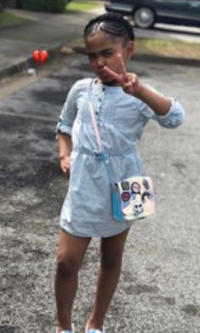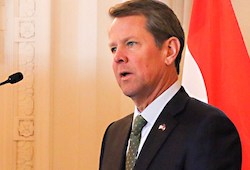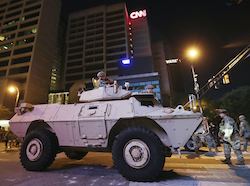and Eric Ture Muhammad The Final Call @TheFinal Call
ATLANTA–In the aftermath of an eight-year-old child being shot and killed in Atlanta, Georgia Governor Brian Kemp called up the National Guard to support the Atlanta police. Questions abound. What role will they play and what are the ramifications of military personnel on the streets of an American city? What comes next for Atlanta and for cities across Black America that have been besieged by shootings or civil unrest?
Activist Arthur “Silky Slim” Reed, of Stop the Killing Inc. in Baton Rouge, Louisiana, has mixed feelings about the National Guard coming into predominantly Black communities due to civil unrest. He said it is not a good idea.
“It depends on what they (National Guard) are being deployed for. If it is to assist with the current Covid-19 pandemic, OK. But far too long, our communities have been marginalized and disenfranchised,” said Mr. Reed.
Gov. Kemp declared a state of emergency on July 8 saying 1,000 National Guard would be called into Atlanta and used in a supportive role guarding buildings that would free up the police to patrol other areas. Atlanta police in recent weeks have called out sick in mass and refused to leave the precincts unless one of their fellow officers needed help. In Atlanta and other cities “sick outs” by police have emerged as a tactic in response to criticisms aimed at police shootings and misconduct which disproportionately impact Black and Brown communities. Nationwide protests and calls to reform and defund police have erupted.

Atlanta like Chicago and other cities experienced a deadly July 4 weekend of shootings including the tragic death of Secoriea Turner. The little Black girl was one of five shooting deaths that occurred over the holiday weekend in Atlanta. According to Associated Press, there is a $10,000 reward for information as authorities searched for at least two people who opened fire on the car Secoriea was riding in near a flashpoint of recent protests.
“Peaceful protests were hijacked by criminals with a dangerous, destructive agenda. Now, innocent Georgians are being targeted, shot, and left for dead,” said Gov. Kemp in a statement. “This lawlessness must be stopped, and order restored in our capital city,” he added.
The killing happened near the Wendy’s restaurant where a Black man, Rayshard Brooks, was killed by a White police officer June 12. The fast food outlet was later burned, and the area has since become a site for frequent demonstrations against police brutality.

Atlanta’s mayor called for justice in Secoriea’s case. However, Mayor Bottoms doesn’t agree with the Georgia governor’s order to mobilize the National Guard in her city. She noted, the governor issued his order without asking if the city needed help. The city had already been coordinating with the Georgia State Patrol, and “at no time was it mentioned that anyone felt there was a need for the National Guard to come in,” Mayor Bottoms said on ABC’s “Good Morning America.”
“What’s interesting is the timing of this military deployment by way of executive order,” began Marcus Coleman, founder and president of Save OurSelves (SOS), based in Atlanta. “The non-communication with the chief executive officer of the target city, combined with the public spats highlight a character flaw issue in our beloved governor,” said Mr. Coleman.
“What’s even more alarming is the cowardice reason given for this mission,” he noted. “Ducking beneath the bullet riddled bodies of Black lives, when the true reason is Caucasians–and even some of our own, were literally scared to death at the sight of uniformed Black men,” he told The Final Call. He was speaking about an armed Black militia that marched through Georgia’s Stone Mountain on July 4.
“Dressed in black, marching on Stone Mountain–home of the (Ku Klux Klan), armed to the tee on the day of a hypocrisy based ‘holiday’ (Fourth of July). My message to Governor Kemp is simple, have the testicular fortitude to state the full scope of your order,” he stated.

The use of National Guard troops in urban areas in response to civil unrest is nothing new and has had various results. Perhaps no city has as dark a history with the National Guard as Wilmington, Delaware. The Delaware National Guard’s occupation of the river town lasted more than nine months from 1968-69, the most prolonged military occupation of a U.S. city since the Civil War. Nearly 3,000 troops were called to the city in the aftermath of the 1968 assassination of Dr. Martin Luther King Jr. which sparked rebellions and uprisings in Wilmington and other cities.
Like today, the National Guard has been deployed in response to protests and rebellions in Black communities often after incidents of injustice and oppression spark a violent response.
In 2015, 1,700 Maryland National Guard patrolled the streets of Baltimore along with 400 state police–deployed after outrage sparked rebellions following the death of Freddie Gray in police custody. The Missouri National Guard were deployed in Ferguson, after protests raged after a White police officer shot and killed unarmed teenager Michael Brown Jr.
At one point, over 17,000 National Guard troops had been deployed in 23 cities in the aftermath of the death of George Floyd in Minneapolis Police custody; Rayshard Brooks, Breonna Taylor in Louisville and others.
Troops have been activated in Colorado, Georgia, Indiana, Kentucky, Minnesota, North Carolina, Ohio, Pennsylvania, South Carolina, South Dakota, Tennessee, Texas, Utah, Washington state, Wisconsin and Washington, D.C.
However, presence of the National Guard sparks concerns about heavy-handed tactics. The National Guard serves a dual role in the U.S. military by serving the community and its country. The Guard responds to domestic emergencies, overseas combat missions, counterdrug efforts, reconstruction missions and more. Each state and the District of Columbia has its own National Guard. However, the president can activate the National Guard and place it under federal control.
***image3**President Donald Trump has repeatedly threatened use of the troops if governors did not quell protests and so that Guard troops could “dominate the streets.” To quell protests near the White House in early June, D.C. guardsmen and other law enforcement on foot and horseback aggressively pushed protestors away from Lafayette Park prior to the president walking to a nearby church for a photo op.
Mr. Trump tweeted concerning the use of guardsman in the nation’s capital: “Our great National Guard Troops who took care of the area around the White House could hardly believe how easy it was. ‘A walk in the park,’ one said. The protesters, agitators, anarchists (ANTIFA), and others, were handled VERY easily by the Guard, D.C. Police, & S.S. GREAT JOB!”
But as shootings in cities continue claiming victims, many of them Black and Brown, there are calls that National Guard troops should be called in to assist in those efforts. In the past, Mr. Trump has threatened to send the National Guard to Chicago to deal with shootings and violence.
Gerald Rose is founder, and CEO of New Order National Human Rights Organization located in Marietta, Georgia. He disagrees with the Georgia governor’s order to deploy the National Guard in Atlanta.
“Plus, he didn’t let Mayor Bottoms know,” of the Guards deployment, conveying the disrespect of the city of Atlanta’s top official, he believes. “I feel it was a political move,” he said.
Deployment of any military element to help fight urban gun violence is counterproductive whatever the role, Kofi Asante with the Philadelphia-based Black Male Community Council told The Final Call. “This is something that should be left for the community to do and something the community must learn to do in securing our community,” he said.
“That level of force (military) would not solve the problem in my mind. We need to solve the problem by providing a different path and use programs and systems that work. Programs like Cease Fire and programs that coordinate the community, law enforcement, community stakeholders, corporate community that come together to work out a plan on how to reach those that cause these problems, providing them with proper education, jobs, and an opportunity for a better way of living,” said Mr. Asante.
“If we don’t do that, nothing is going to change. Without an approach such as this, you will only create a more volatile situation,” he added.
Student Minister Abdul Sharrieff Muhammad, Southern Regional representative of the Nation of Islam at Mosque No. 15 in Atlanta bore witness to what the Honorable Minister Louis Farrakhan warned would happen in his recent July 4 address entitled “The Criterion.”
“The Honorable Minister Louis Farrakhan told us at some point that this was going to happen, the people was going to call for the National Guard. But the mayor or what the governor is doing, the governor is over the mayor. The mayor didn’t call for the National Guard, but the governor is showing this ‘master’ relationship. He called in the National Guard and they’re coming, and you know they’re no friend of the Black community. They’re coming in because when they move in here, they don’t care nothing about no friendship; they’re coming with one order: you either obey or they shoot to kill,” he said.
Student Min. Muhammad said that some officials have prioritized control over the needs of the Black community. “They want control of the city; they really want the airport. They want to take the airport from the city,” he continued.
“They’re angry because of what the mayor did by firing those police officers. Now, the police call themselves going on strike, the ‘blue flu.’ Everything that the Honorable Minister Louis Farrakhan has told us is coming true whether they like it or not. And all I say to all of us, just keep our eyes open and keep looking. The fall of America is in full effect. Take it or let it alone.”
Min. Farrakhan has also warned Black America in previous messages that there would be a call for the National Guard to be deployed in urban cities if the fratricidal violence does not stop. The Muslim leader has urged Black people to make their neighborhoods clean, safe and decent places to live. He called for 10,000 Fearless Men and Women to take the lead in this effort.
“We need to develop a new way of securing our neighborhood. I wouldn’t call it policing because I don’t like that word, it leaves a bad taste in my mouth,” said Leroy Muhammad, an organizer of the 10,000 Fearless in the Delaware Valley Region based in Philadelphia at Mosque No. 12.
“The role of the 10,000 Fearless under the new paradigm will be to monitor, protect, and become a correcting element in our neighborhoods. Minister Farrakhan said he wanted 10,000 men and women to stand between the gangs and the guns,” said Mr. Leroy Muhammad.
“So we can’t fear our people. We have to bring an element of loving our people more than they hate themselves. We have to provide our people with that type of love. We have to become saviours,” he added.
Student Min. Sharrieff Muhammad said that for those seeking a better relationship between officials and the community to consider the Nation of Islam’s track record.
“They need to bring the Nation of Islam to the table, that’s the bottom line,” he continued.
“We got a track record, whether they like the Honorable Minister Louis Farrakhan, whether they like Nation of Islam or not, we have a proven track record by the grace of God.”
Tariqah Shakir-Muhammad, J.A. Salaam and Final Call staff contributed to this report.












